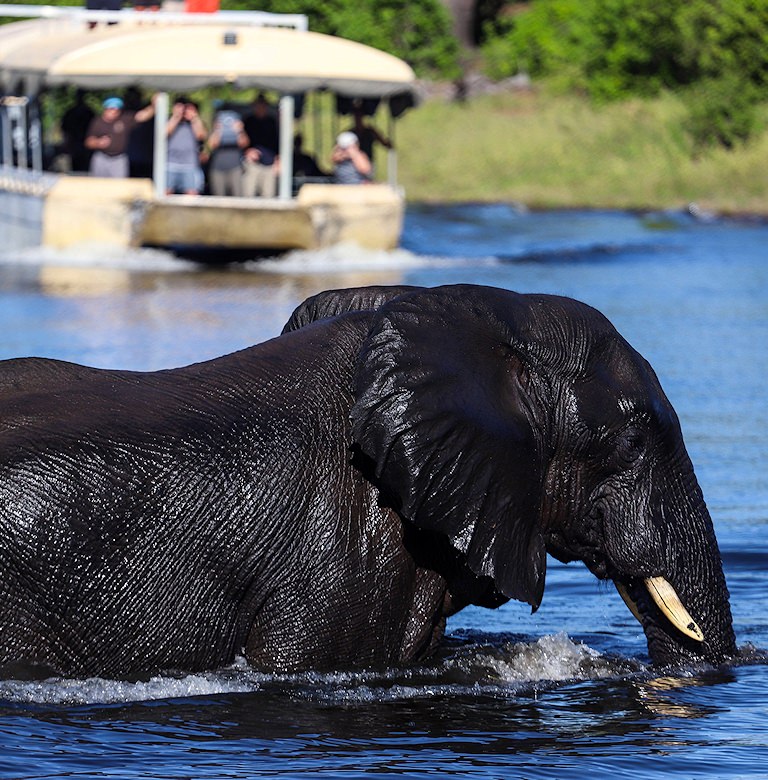12 Day Botswana Buzz Private Overland Safari
Help Me Plan- Home
- >
- African Safari
- >
- Botswana Packages
- >
- 12 Day Botswana Buzz Private Overland Safari
Summary
This 12 Day Botswana Buzz private overland safari links South Africa, Botswana and Zimbabwe in one seamless journey. Travel with a dedicated African Sky guide from Mabula and Mapungubwe to the Tuli Block, Makgadikgadi Pans, Chobe National Park and Victoria Falls.
- 1 Night Mabula Private Game Reserve
- 1 Night Limpopo Bushveld
- 2 Nights Tuli Block
- 1 Night Francistown
- 2 Nights Makgadikgadi Pans
- 2 Nights Chobe National Park
- 2 Nights Victoria Falls
Price Per Person Sharing From:
From: POAThe price can be reduced by substituting accommodations
What influences prices?
South Africa and Botswana Safari Itinerary: 12 Day Botswana Buzz
Day 1: Arrival / Limpopo Bushveld

Guests are met and welcomed at a location of their choice in Johannesburg by their private African Sky guide. After taking care of a few formalities, your tour departs the city and travels north along South Africa's national N1 route. Our first stop today is at “Adventures with Elephants” adjacent to Mabula Private Game Reserve. Offering more than the usual “touch and feel” activity, Adventures with Elephants provides hands-on educational interactions that introduce you to these intelligent giants in a responsible way.
After your elephant interaction, you'll retire to nearby Mabula Game Reserve, where on arrival you'll be assisted with check-in. After some time allowed for rest and relaxation, you'll enjoy a late afternoon and early evening open 4x4 game drive. Mabula's varied ecosystem means the area is home to a great variety of animal and bird species, including Africa's iconic Big Five. Possible sightings include hyena and jackal, and a variety of antelope including red hartebeest, eland, gemsbok and blesbok – species not often seen in many reserves in South Africa.
Day 2: Limpopo Bushveld / Mapungubwe
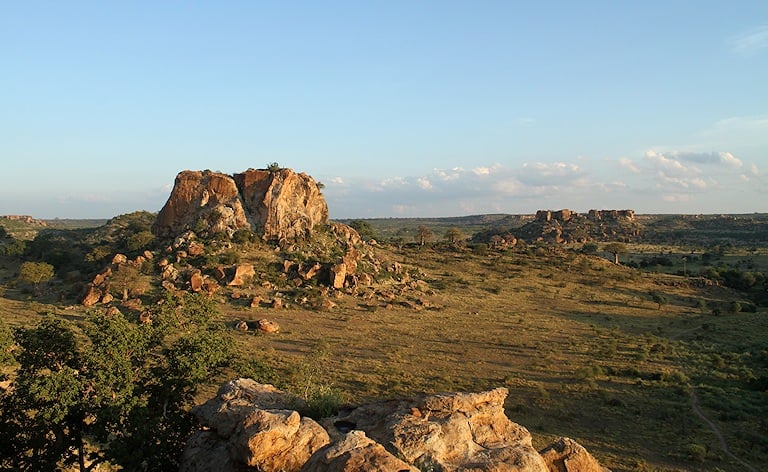
Highlights
- Private meet-and-greet in Johannesburg with your African Sky guide.
- Interactive elephant experience at Adventures with Elephants near Mabula.
- Late afternoon Big Five game drive in Mabula Game Reserve.
After breakfast, your tour rejoins the national N1 highway and continues north to Mapungubwe in the Limpopo Valley. En route, we'll stop at Makapansgat near Mokopane (previously Potgietersrus), an archaeological location within the Makapansgat and Zwartkrans valleys. These valleys are important paleontological sites, with the local lime works containing Australopithecus-bearing deposits dating back to between 3 and 2.6 million years BP, and they form part of South Africa’s Fossil Hominid Sites World Heritage area. The entire Makapan Valley is declared a South African Heritage Site.
After a guided tour of the site, your tour continues in a northerly direction, arriving at Mapungubwe at around 13H00. While here, you'll enjoy various activities in the region. The Mapungubwe landscape is an open, expansive savanna at the confluence of the Limpopo and Shashe rivers. Mapungubwe developed into the largest kingdom in the subcontinent before it was abandoned in the 14th century. What survives are the almost untouched remains of the palace sites and the settlement area dependent upon them, as well as two earlier capital sites, presenting an unrivaled picture of social and political development over some four hundred years. Mopane Bush Lodge also offers guided excursions to rock shelters within their reserve to view existing rock art panels.
Day 3-4: Tuli Block
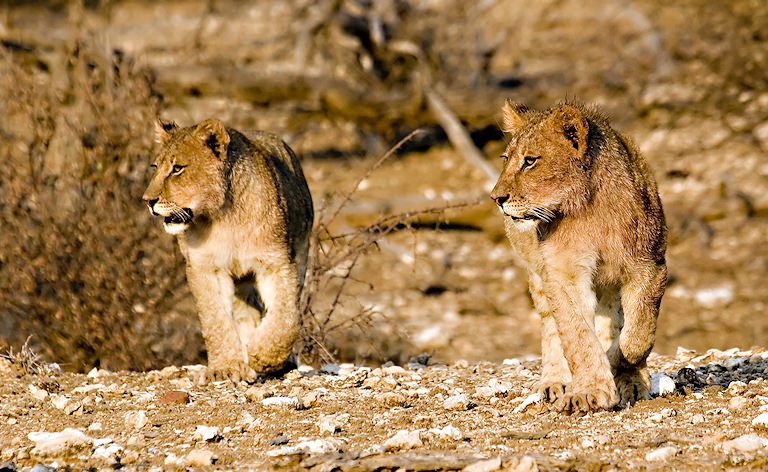
Highlights
- Scenic overland journey through the Limpopo Valley.
- Guided visit to Makapansgat, an important fossil hominid site.
- Explore the Mapungubwe Cultural Landscape, a former Iron Age kingdom.
After breakfast, your tour travels westwards, bypassing the small settlement at Alldays before making our way to the Platjan border control point, where we'll enter Botswana. After crossing the Limpopo River, we'll join the Tuli Reserve road and travel the short distance to our overnight accommodation, arriving at Limpopo River Lodge around lunchtime. The Tuli Block in northeastern Botswana is unique compared to most of the country’s wildlife reserves, as it consists mostly of privately owned land rather than state-owned national parks like the Chobe National Park and the Okavango Delta.
This arrangement came about in 1895 when Chief Khama of the Bamangwato people ceded the land to the British South Africa Company as a buffer against incursions by Boer farmers and as part of Cecil Rhodes’s envisioned route north. While at Limpopo River Lodge, you'll enjoy guided game drives conducted by your African Sky guide, where animals such as elephant – common in the area – as well as leopard, cheetah, hippo, crocodile and various antelope species like impala may be seen. Birdlife in the area is abundant, and birders will be excited at the prospect of sighting Pel's fishing owl, a rare species in Southern Africa. During the drier months, short forays on foot into the Limpopo riverbed may also be undertaken – always checking carefully for wildlife first.
Day 5: Francistown
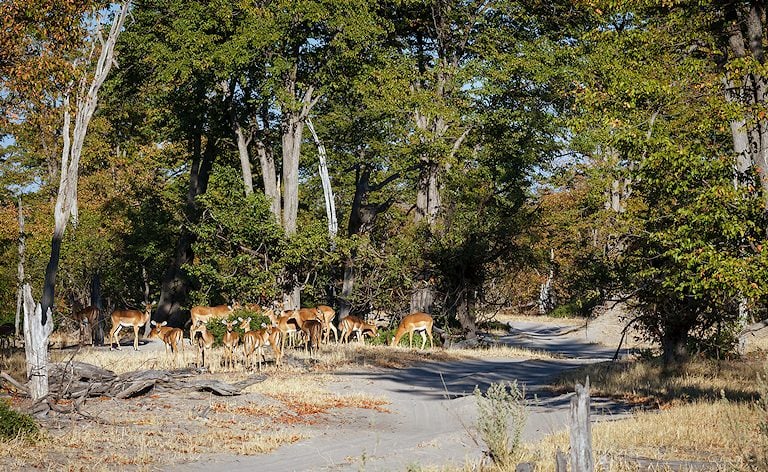
Highlights
- Cross the Limpopo River into Botswana’s remote Tuli Block.
- Guided game drives from Limpopo River Lodge in a privately owned reserve.
- Excellent chances of seeing elephant, big cats and rare Pel’s fishing owl.
After breakfast, your tour travels westwards, bypassing the small settlement at Alldays before making our way to the Platjan border control point, where we'll enter Botswana. After crossing the Limpopo River, we'll join the Tuli Reserve road and travel the short distance to our overnight accommodation, arriving at Limpopo River Lodge around lunchtime. The Tuli Block in northeastern Botswana is unique compared to most of the country’s wildlife reserves, as it consists mostly of privately owned land rather than state-owned national parks like the Chobe National Park and the Okavango Delta.
This arrangement came about in 1895 when Chief Khama of the Bamangwato people ceded the land to the British South Africa Company as a buffer against incursions by Boer farmers and as part of Cecil Rhodes’s envisioned route north. While at Limpopo River Lodge, you'll enjoy guided game drives conducted by your African Sky guide, where animals such as elephant – common in the area – as well as leopard, cheetah, hippo, crocodile and various antelope species like impala may be seen. Birdlife in the area is abundant, and birders will be excited at the prospect of sighting Pel's fishing owl, a rare species in Southern Africa. During the drier months, short forays on foot into the Limpopo riverbed may also be undertaken – always checking carefully for wildlife first.
Day 6-7: Makgadikgadi Pans
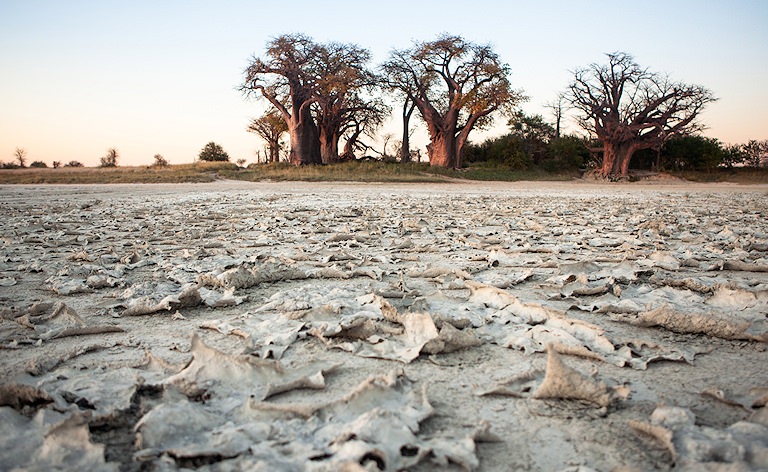
Highlights
- Relax at Nata Lodge, an oasis near the eastern Makgadikgadi edge.
- Explore the vast Makgadikgadi salt pans and their dramatic open landscapes.
- Visit historic baobabs like Green’s Baobab and Chapman's Baobab near Gweta.
After a relaxing morning and a late breakfast, your tour departs bustling Francistown and takes the leisurely drive north-west to the rural village of Nata, close to Sowa Pan on the eastern side of the great Makgadikgadi Pans. Nata Lodge is a welcome retreat in an otherwise harsh environment. Set amongst Mokolwane palms, facilities at the lodge include a full-course restaurant, bar and lounge, swimming pool, and a gift shop selling, among other items, traditional Tswana basketry. Lesser galagos are frequent nightly visitors to the restaurant area, and Nata Lodge also offers a complimentary Wi-Fi service for guests wanting to connect between game activities.
Your second day at Nata is spent exploring the nearby Makgadikgadi Pans. These huge salt pans are remnants of ancient Lake Makgadikgadi, created around two million years ago with the development of the Harare–Kalahari Axis, and today they form one of Southern Africa’s key breeding areas for flamingos. As rainfall patterns shift, surplus water from the Okavango Delta may push eastwards along the Boteti River and fill portions of the pan, attracting a seasonal influx of wildlife and large flocks of waterbirds. During the day we also travel westwards to the Gweta district, visiting historic baobabs such as Green's Baobab and the famous Chapman's Baobab, long used as route markers and a kind of “post office” by early explorers, missionaries and traders crossing this remote landscape.
Day 8: Chobe National Park
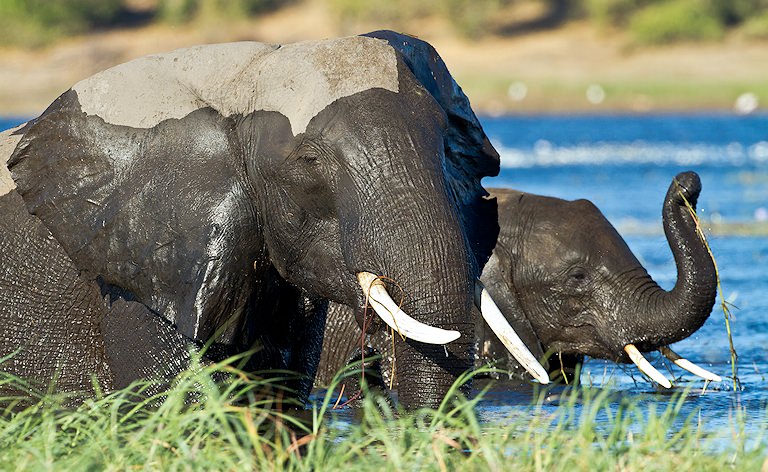
Highlights
- Long, scenic drive from Nata to Kasane with potential roadside wildlife sightings.
- Arrive on the banks of the Chobe River, gateway to Chobe National Park.
- Introduction to the Kavango–Zambezi Transfrontier Conservation Area.
Departing Nata, our tour continues northwards, tackling the dead-straight 300-kilometer stretch of road to Kazungula on the Chobe River in the far northeast of the country. After passing through the “buffalo fence” about 50 km north of Nata, the possibility of wildlife sightings, particularly elephant, becomes very real as we move into prime game country. Early departures are often rewarded with spectacular sunrises over the open bush. Once in Kazungula, we'll travel the short distance to Kasane and your overnight accommodations, where we assist with check-in and you settle into your room.
After assisting with check-in, you'll say goodbye to your African Sky guide as he or she returns by road to South Africa. Chobe National Park finds itself at the core of the Kavango–Zambezi Transfrontier Conservation Area, a cross-border conservation effort incorporating some 444,000 square kilometers of protected and communal land across five countries. The region is home to Africa's largest remaining elephant population and aims not only to protect wildlife but also to support the livelihoods of rural communities that live alongside lions, elephants and other species that can damage crops and livestock. The afternoon is typically free for your first river cruise or game drive, depending on lodge scheduling.
Day 9: Chobe National Park
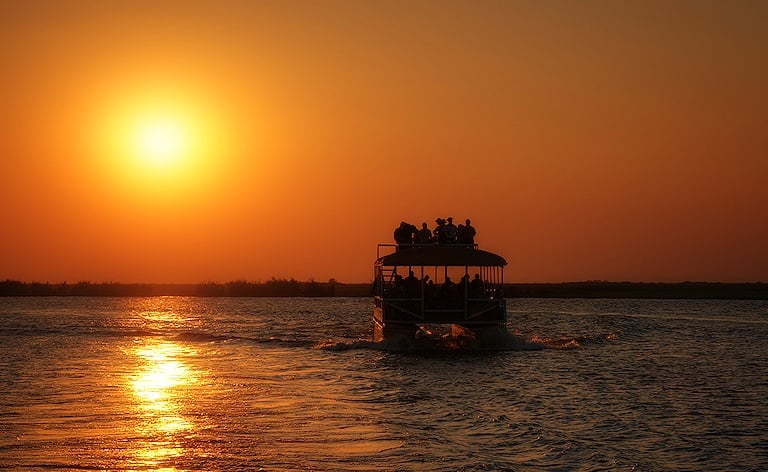
Highlights
- Game viewing along the Chobe riverfront, one of Africa’s top wildlife corridors.
- Large elephant and buffalo herds, plus puku and other antelope on the floodplain.
- Outstanding predator and bird viewing on drives and optional river cruises.
The Chobe riverfront where your lodge is located is a hive of wildlife activity, one of a handful of “must-see” hotspots on the African continent. The riverfront is an “ecosystem within an ecosystem,” with large daily migrations as animals move into the surrounding woodland during the day to feed and then return in the late afternoon to quench their thirsts. The floodplain, close to the confluence of the Chobe and Zambezi rivers, is an oasis in an often harsh and unforgiving environment. Hundreds of hippos, large Nile crocodiles and an incredible variety of birdlife are just some of the animals encountered here, and the floodplain is home to Botswana's only population of puku antelope.
Elephant herds numbering in the hundreds are often seen during the late afternoon, sometimes swimming across one of the many channels, and close encounters are all but guaranteed. Buffalo often wade across to the perennially green islands in search of better grazing. Lion, spotted hyena, wild dog and leopard are sometimes sighted along the riverbank, while many antelope species, including the impressive sable, are present. Giraffe, zebra, impala and wildebeest are frequently seen on game drives, and a lucky few may witness a kill. With the golden light of late afternoon coming from just the right direction, a game-viewing cruise on the Chobe River is about as perfect a location as any wildlife photographer could hope for, and today your activities alternate between land-based drives and unforgettable water-based safaris.
Day 10: Chobe National Park / Victoria Falls
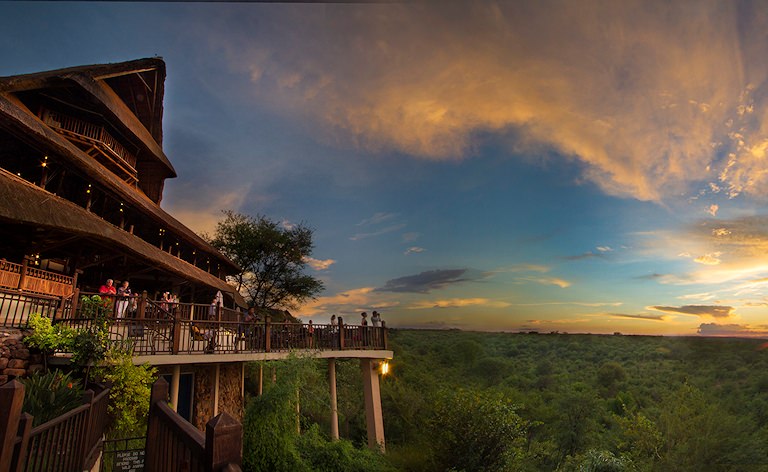
Highlights
- Road transfer from Chobe to Victoria Falls in neighboring Zimbabwe.
- Stay at Victoria Falls Safari Lodge overlooking a busy waterhole and park.
- Guided tour of Victoria Falls, one of the Seven Natural Wonders of the World.
After breakfast, you'll be met and transferred to Victoria Falls (group transfer) in neighboring Zimbabwe, en route to the Victoria Falls Safari Lodge. The accommodation is ideally located on elevated ground and faces westwards, overlooking the Zambezi National Park. From the lodge, both wildlife sightings – especially elephants at the waterhole – and magnificent sunsets are almost daily occurrences. The lodge also boasts the popular Boma and Makuwa-Kuwa restaurants, offering traditional Zimbabwean fare, drumming and dancing displays that give you a taste of local culture.
After check-in and some time spent relaxing, guests will enjoy a guided tour of the mighty Victoria Falls, locally known as “Mosi-oa-Tunya” or “the smoke that thunders.” The Falls span roughly 1,700 meters in width and plunge over 100 meters into the turbulent gorge below, creating an impressive display of mist, rainbows and roaring water. Walk along the rainforest trails for multiple viewpoints, each offering a different angle on one of the world’s largest sheets of falling water. The Falls are a worthy member of the Seven Natural Wonders of the World and a spectacular highlight of your journey.
Day 11: Victoria Falls
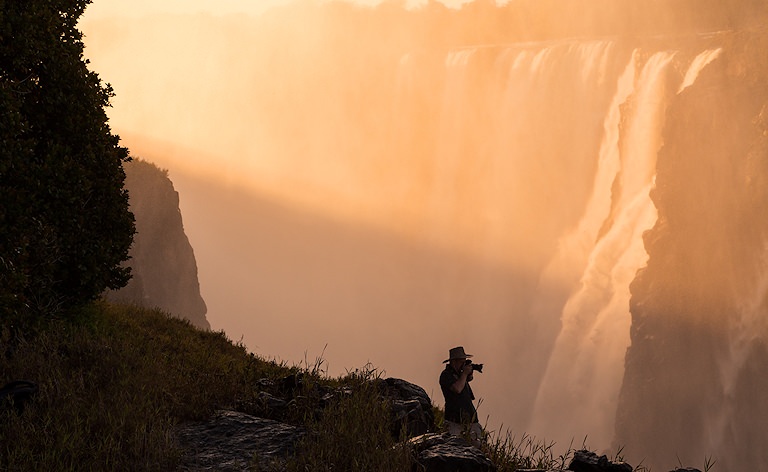
Highlights
- “Walking with Lions” conservation experience at Masuwe Estate.
- Free time for optional adrenaline or scenic activities around Victoria Falls.
- Relaxing sunset cruise on the Zambezi River with drinks and snacks.
First thing this morning, you'll be met and transferred to Masuwe Estate, not too far from Victoria Falls, where you'll enjoy their “Walking with Lions” activity. The experience forms part of an active conservation program, Africa's first genuine effort to ethically reintroduce the offspring of captive-bred lions into the wild. In the first stage – in which you'll be participating – young lion cubs are taken out into the bush to help build their confidence in a natural environment. Lion cubs enjoy daily walks with or without guests, as the primary role of the project is conservation rather than commercial tourism. As they gain confidence, they start to develop and practice their stalking and hunting skills, which are crucial for later stages of the program.
By participating, you're actively assisting in pre-release training for the cubs as well as providing essential funding to the program. On this once-in-a-lifetime activity, you'll meet young cubs in the bush and watch as they learn, explore and play, creating superb photographic opportunities and powerful memories. Once you've returned to your accommodations, you may freshen up, enjoy your lodge's amenities or take an afternoon nap. Some guests prefer to be on the go all day and book additional optional activities, which can be arranged at reception. During the late afternoon, you'll be transferred to a local jetty where the remainder of your day will be spent enjoying a tranquil sunset cruise on the mighty Zambezi River, with drinks, snacks and the chance to spot hippos, crocodiles and elephants along the banks.
Day 12: Departure
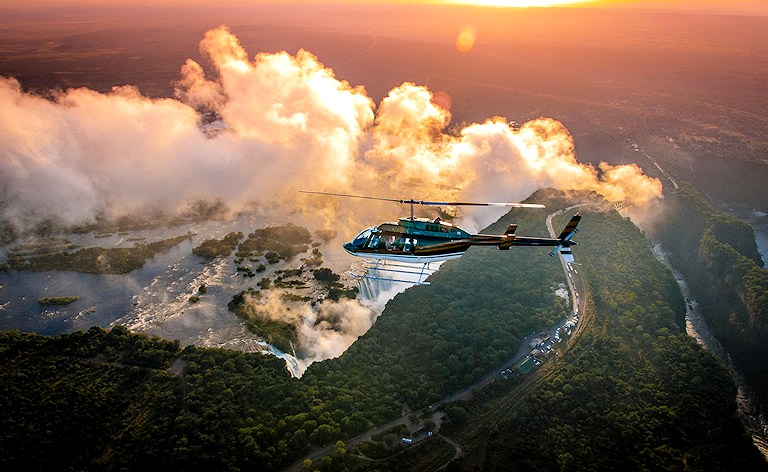
Highlights
- Morning at leisure for last-minute activities or curio shopping.
- Optional helicopter or microlight flight over Victoria Falls (time permitting).
- Scheduled flight back to Johannesburg to conclude your safari.
Today your morning is at leisure, although many folks choose to book an additional last minute activity if time permits. Activities such as helicopter flips or microlight flights over the Falls start early and last just fifteen minutes, offering a dramatic aerial perspective of the Zambezi River and the curtain of water below. Alternatively, you may prefer a slower start, making the most of your lodge, browsing the craft markets or simply savoring a final view over the bush from the deck.
Later, at a time to be announced, your transfer will arrive and take you to the local airport for your flight to Johannesburg in South Africa. After check-in and border formalities, you can browse the shops or enjoy a final drink before boarding, reflecting on the journey behind you. Your return flight brings to an end a memorable Botswana and Victoria Falls tour, filled with varied landscapes, rich cultural encounters and outstanding wildlife experiences across three remarkable countries.
Included
- 1 Night Mabula Game Lodge
- 1 Night Mopane Bush Lodge
- 2 Nights Limpopo River Lodge
- 1 Night Marang Gardens
- 2 Nights Nata Lodge
- 2 Nights Chobe Safari Lodge
- 2 Nights Victoria Falls Safari Lodge
- Private African Sky Guide: From Day -8
- Resident Rangers: From Day 9-10
- Private Activities: From Day 11-12
- Private Air Conditioned Vehicle: From Day 1-8
- Open 4x4 Vehicles: From Day 9-10
- Only Meals Specified
- Victoria Falls to Johannesburg
- Transfer from Chobe Safari Lodge to Victoria Falls Safari Lodge (Day 10)
- Victoria Falls Safari Lodge to Victoria Falls Airport (Day 12)
- All Activities Included in the Itinerary, Unless Stated as Optional
- All Entrance Fees to Places Mentioned in the Itinerary, Unless Stated as Optional
- Tourism Levy
- All Applicable Taxes
- All Park Fees, Where Applicable
Excluded
- International Airfare (To and From South Africa)
- Personal and Medical Insurance
- Drinks
- Gratuities
12 Day Botswana Buzz Private Overland Safari
